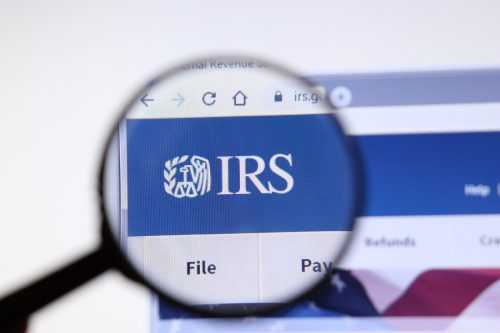The IRS Just Released This Warning to Taxpayers a Week Before the Deadline

If you’ve procrastinated on filing your tax return, you’ll need to get moving, as Tax Day is right around the corner. Throughout tax season, the Internal Revenue Service (IRS) has issued multiple warnings to help you ensure your taxes are filed correctly and avoid fines and penalties. Now, the IRS has sent out another last-minute warning you’ll want to be sure to heed. Read on to learn about the important step you must take to protect yourself and your tax return this year.
RELATED: The IRS Just Gave This Urgent Last-Minute Warning to Taxpayers.
Request an Identity Protection Pin from the IRS.

Fraudsters are commonplace in the online world, and it seems as if we’re hearing about a new scam every week. Unfortunately, your taxes are also vulnerable to these cons. Tax-related identity theft occurs when someone finds your Social Security number (SSN) and uses it to file a tax return and claim a fraudulent refund. To protect yourself from this, the IRS recommends setting up an Identity Protection (IP) Pin.
As the agency explains in its April 11 news release, the six-digit IP Pin is assigned to you individually, known only by you, and used when you file either an electronic or paper return. The IP Pin helps protect and prevent misuse of your SSN, as well as your Individual Taxpayer Identification Number (ITIN), which thieves obtain and use to claim a fraudulent tax refund in your name. The IRS especially recommends extra security measures for existing victims of identity theft, as well as those who think their personal information may have been exposed by theft or fraud.
You can request an IP Pin on the IRS site.

To get your added layer of protection via an IP Pin, you will need to complete a thorough identification check. Taxpayers can visit IRS.gov/getanippin to do so, and once authentication is complete, a pin will automatically be generated. New IP Pins are provided annually, and taxpayers will either receive notice from the IRS in early January or find their updated pin online. Taxpayers should be aware, however, that once they’re in this program, there’s no way to opt back out.
If the IRS suspects you may have been a victim of tax-related identity theft, the agency can also automatically assign an IP Pin for you. In this case, you will receive a notification outlining the incident and your assigned IP Pin, the agency said.
You will also receive a letter from the IRS if they identify and pull a suspicious return, the agency explains. The letter will inform you that the agency won’t process the return without a response from you. Depending on the situation, you will be either asked to use an online tool to verify your identity (via Letter 5071C) or call the IRS directly (Letter 4883C). If your information was part of a data breach, you could be required to visit an in-person Taxpayer Assistance Center (Letter 5747C).
RELATED: For more up-to-date information, sign up for our daily newsletter.
There are telltale signs that you’re a victim of tax-related identify theft.

Other than a letter from the IRS, there are additional signs your tax return may have been duped. The agency outlines these red flags on the IRS site. If you can’t file your taxes electronically because of a duplicate SSN, this is a dead giveaway that a fraudster may have beaten you to the punch. Make sure to double-check that all of the numbers are correct before jumping to conclusions, but if you’ve got the correct SSN entered, you’ll want to file a claim.
The IRS may send you a letter alerting you of fraud, but if you get something else in the mail, like a tax transcript that you didn’t request, this is another sign something is amiss. Online hints include a notice that a new account has been created in your name, notice that your existing account has been accessed or disabled without you doing anything, or a notice from the IRS that you owe additional money or had your refund offset to a due balance.
Additionally, if you get a notice from the IRS that you received income for an employer you never worked for, or if you were assigned an Employer Identification Number (EIN) without applying for one, it could mean trouble.
Tax-related identity theft is serious, but it has become less common in recent years.

Identity theft in general can be scary, as it can shake your financial stability and make credit difficult to rebuild. But according to Experian, tax identity theft is not as common as other kinds of identity theft—more often, someone steals your credit card information or opens a new line of credit in your name. While this isn’t necessarily “good news,” you can take comfort in the fact that there was actually an 80 percent decline in the number of taxpayers that filed tax-fraud claims between 2015 and 2019.
In the unfortunate event that you are a victim of tax-related identity theft, there are proactive steps you can take, the IRS notes. First, complete and submit a Form 14039, also known as the Identity Theft Affidavit. The IRS will work with you to verify your identity as the legitimate taxpayer and get rid of the fraudulent return. You’ll also get a “special marker” on your account with the automatic IP Pin each year.
You may need to further check with your state tax agency to see if you need to take preventative steps at that level, the IRS cautions.
RELATED: The IRS Warns You Must Do This by April 18—And It’s Not This Year’s Taxes.